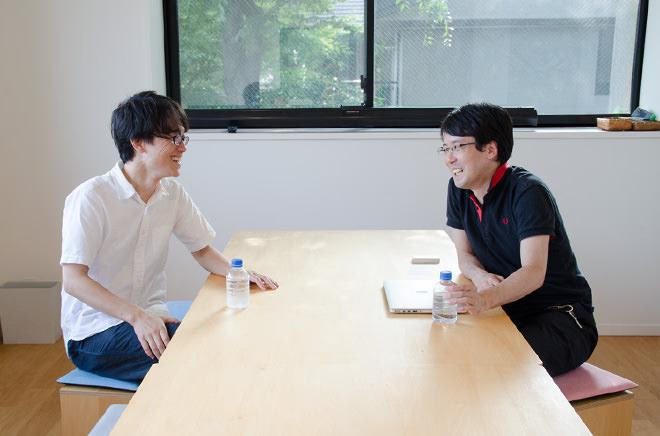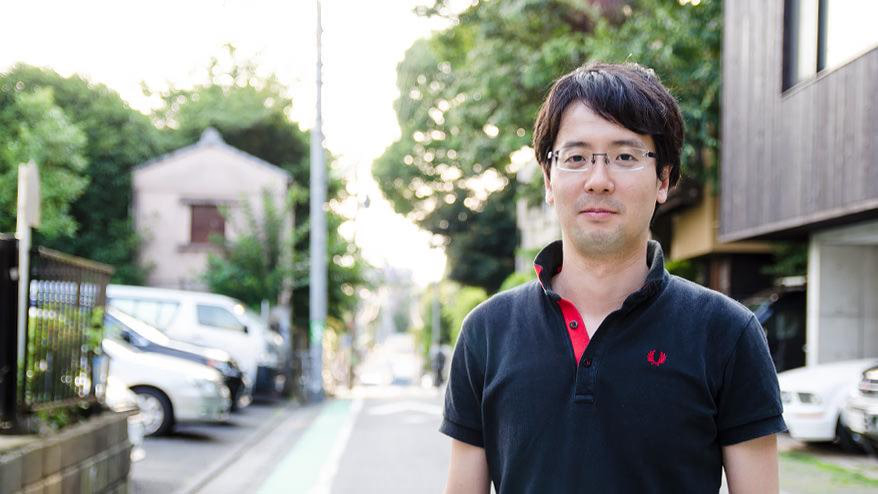今回登場いただくのは、株式会社 Surface & Architecture(以下、S&A)のUXディレクター今村健さん。今村さんは、一般消費者向けのWebやアプリなどのコンセプトメイキング、さらにUXデザインのコンサルティングなどを主に手がけるUXディレクターです。
そして聞き手は、通信事業サービスのアプリ開発の案件で今村さんと一緒に仕事をした経験をもつ、モノサスのデザイナー小野木(デザイン部 部長)が務めます。
互いに年齢は30代半ば。大学時代はともにバンドマンだったという驚きの共通点も発覚! キャリア10年のふたりが、今後デザインの仕事に大切なことは何かについて、語り合います。
(インタビュー構成 田中亜希)
-
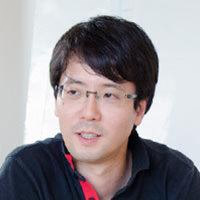
-
今村 健さんプロフィール:
九州大学大学院デザインストラテジー専攻卒業。日立製作所デザイン本部にて、建設機械モニターの画面デザイン、ITシステム管理ソフトウェアなどの組み込み機器や Web アプリケーションの UI/UX デザインに携わる。現在は S&A にて、音声対話アプリケーションや動画視聴サービスなどコンシューマー向けサービスのコンセプトメイキングから UX デザインのディレクションをおこなっている。
それぞれの役割がしっかりあって、建設的に議論ができる。そういう打ち合わせは理想的
-
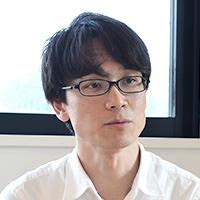 小野木
小野木 -
今村さんと初めてお会いしたのは、今年の1月ですよね。
-
 今村さん
今村さん -
そうですね。
-
 小野木
小野木 -
出会ったとき……、僕は、キュンときましたよ。
-
 今村さん
今村さん -
え~⁉
-
 小野木
小野木 -
いや、ウソウソ。それはないですけど(笑)。最初は、ブランディングを手がける会社の方だと紹介されて、ピリッとしたオーラを感じたというか。たとえば、こちらが認識不足で少しでも方向性のズレた提案をすると、ボソッと「これ、ブランディングの観点からすると違うんですよね」と一刀両断されそうな雰囲気を感じたのを覚えています。
-
 今村さん
今村さん -
そうだったんですか(笑)。プロジェクトが進んでしばらく経ったとき、たしかエクセルシオールでお茶しましたよね。
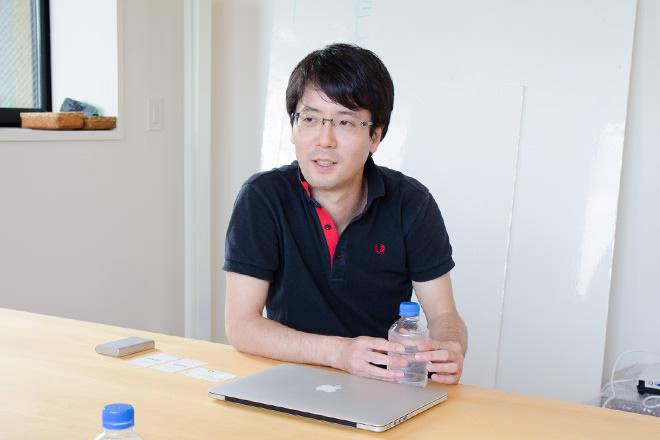
-
 小野木
小野木 -
そうそう。弊社の伊藤が声をかけてくれて、3人で。そしたら、さっそく、デザインへの考え方とかいろいろ共感できるところがあったんですよ。
-
 今村さん
今村さん -
小野木さんと話していると、結構ロジカルな考え方をするかたなんだなと感じ取れて、その時点ですぐに、あ、この人とは合いそうだと思いました。小野木さんは理系出身で、僕もそう。理系出身のデザイナーというのはね、僕のなかでポイント高いんですよ。
-
 小野木
小野木 -
最初から相当楽に話せましたよね。初対面なのに、つい、「将来はどうすんですか」とか聞いちゃうぐらい(笑)。
-
 今村さん
今村さん -
あはは! そうでした、そうでした。
-
 小野木
小野木 -
今村さんは、打ち合わせ中に、周りをハッとさせる発言をよくしますよね。妙に説得力があるというか。僕はそれを「神のひと言」と呼んでいますが(笑)。ずっと黙っていた今村さんが、「僕、ちょっと思うんですけど……」と口を開くと、だいたいすごいキーワードが出てくる。
-
 今村さん
今村さん -
いや、あれはね、困るんですよ。自由闊達に意見を言える雰囲気が大事なのに、僕が何か言おうとすると、みんなが「あ、来た!」という感じで構えるので、下手なことを言えないなと、委縮しちゃうんです(笑)。
しかも、あの状況は僕がすごいのではなくて、参加メンバーとの打ち合わせの雰囲気がいいんですよ。デザインに集中して取り組む人と、僕みたいに一歩引いた立場でいる人間と、ふたつの役割がプロジェクトのなかにいるわけですから。今回の仕事の打ち合わせは、みんなで建設的に議論ができて、とても理想的でした。
映画監督のように、編集作業や細かいカット割りにまでこだわりをもつ。それが僕の仕事
-
 小野木
小野木 -
今村さんのいらっしゃる S&A さんと仕事をしていてすごいなあと思うのは、UX だけを担当なさるのかと思いきや、UI の部分もプランニングされて、さらにトンマナ設計まで全部決めますよね。そして、一連のことをすべて資料として作り込んだうえで、打ち合わせをスタートさせる。何というか、最初から大きな束をどーんと提示される感じがあります。
-
 今村さん
今村さん -
ああ、それは大事なことだと思っています。初めから終わりまで、細かいところまで一貫して見ていきたいなと。たとえば映画監督に例えると、監督はシナリオを見て「あ、いいね。じゃあ、あとは適当にやればいいよ」という作業はしないと思うんです。撮影をきちんと見てオッケーを出して、そのあとの編集作業や細かいカット割りにまでこだわりをもつ。僕の仕事は、それと同じだと思っています。
-
 小野木
小野木 -
今村さんは、社会人になる前に大学院にも通っていたと聞きました。勉強家ですよね。
-
 今村さん
今村さん -
いえ、そんなことはないですけど……。
-
 小野木
小野木 -
僕は大学3年間、勉強らしい勉強はせずに、ほぼバンド生活を送っていましたよ。
-
 今村さん
今村さん -
え、バンド? 僕もやっていましたよ。
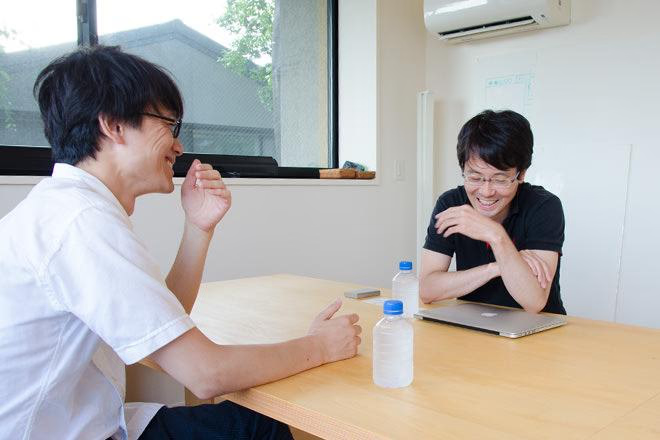
-
 小野木
小野木 -
……ウソ⁉
-
 今村さん
今村さん -
ホント。実はミュージシャンになるのが夢でしたから(笑)。60年代のブルースロックが大好きで、エリック・クラプトンが神様、みたいな。ギターをずっと弾いていました。
-
 小野木
小野木 -
えっ、僕も楽器はギターをやっていましたよ。ただ、音楽のジャンルはデスメタルですけど。髪は肩ぐらいまであって……。
-
 今村さん
今村さん -
えーーーっ⁉ マジっすか! デスメタル! ジャンルはまったく別とはいえ……。やっぱり、最初に会ったときから、何か共通点があると思っていたわけだ。
-
 小野木
小野木 -
いやぁ、偶然ですね(笑)。バンドの話もかなり興味がありますけど、話題を戻しましょう! 大学院では何を専攻していたんですか?
-
 今村さん
今村さん -
芸術工学部という学部で、デザインストラテジーを専攻していました。午前中はデッサンの授業を受けるけれど、午後はプログラミングだったり。いい意味でハイブリッドな学部で、CG の授業もあれば、都市景観や建築、グラフィック、デジタルメディアの Web や映像など、本当にいろいろなことを学びました。
-
 小野木
小野木 -
デザインストラテジーというのは、具体的にどういうことを勉強するんですか?
-
 今村さん
今村さん -
ひとりでデザインの実制作をするわけではなくて、工学部や文系の人、それから仕事でデザインを学びたいと考えている人など、いろんな人が集まって、4、5人でプロジェクトチームを組むんです。そこで、みんなで役割分担をしてデザインを作り上げる。僕は、ブランディングやサービス、製品について学びながら、デザイン制作を担当しました。
-
 小野木
小野木 -
それで社会人になった、と。
-
 今村さん
今村さん -
はい。新卒で入社した会社では、IT システム管理のソフトウェアのデザインとか、ショベルカーやホイールローダーなどの建設機械のモニターのデザインとか。つまり、GUI の仕事もガッツリやりました。それで、年数が経つうちにマネジメントやディレクションもやるようになって……。
でも、入社して4、5年が経った頃、全部の作業をやってみたいという気持ちが強くなりまして。企画からデザイン、制作、最終的には Web のコーディングまで。でも、大きな会社は分業制なのでそれはできないですよね。それなら、もう少しコンパクトな会社に移ろうと。
-
 小野木
小野木 -
それで転職した先が S&A なんですね。
-
 今村さん
今村さん -
そうです。当時の僕の先輩の、これまた大学時代の先輩が立ち上げた会社なんです。それが今のS&A。その頃まだ社員はいなかったのですが、社長に誘っていただき社員になることができました。でも、今やっているのは、ほぼディレクションなんですけどね(笑)。全部自分でやるのは無理なんだとわかりました。
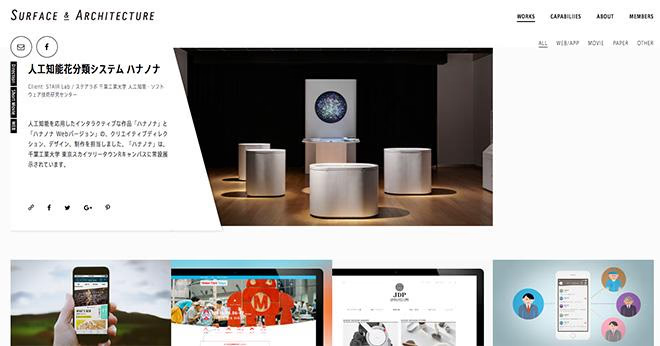
今村さんの所属する Surface & Architecture の Web サイト(2017.07.21現在)
AI 時代での、デザイナーの価値って何だろう
-
 小野木
小野木 -
いきなり真面目な話になりますけどね、実は僕、将来どうしようかなあと思っているんですよ。極端なことを言うと、デザインから一度離れたほうがいいのかなと思うことすらあって。
-
 今村さん
今村さん -
その話は興味深いですね。僕も、この先どうしようかということは考えますよ。
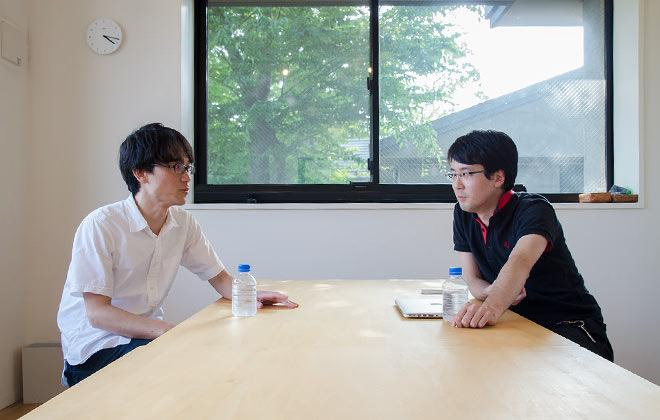
-
 小野木
小野木 -
デザインを作り始めるのは、楽しいんです。真っ白なキャンバスを開いた瞬間は、気持ちが上がる。でも、ページを量産していくと、これでいいのかな、と。
-
 今村さん
今村さん -
たしかに。量産というか、デザインするものがパターン化されていくと、ちょっと……というのはありますよね。たとえば、ここにナビゲーションバーを置いて、コンテンツエリアはこういうデザインで、という風に。
-
 小野木
小野木 -
個人的に思うのは、Google と Apple がデザインのガイドラインを公にしてから、いろいろな流れが変わったような気がするんですよね。UIUX とはこういうものだという風潮ができてきたというか。
-
 今村さん
今村さん -
なるほど。それと、スマホが普及したことで、ある程度成熟してきたかなというところもありますよね。いろいろなデザインや UIUX が試されてきた結果、「こういう UI のパターンが使いやすいね」という感じになってきたというか。アプリを使っている人って、いろいろなアプリを平行して使いますよね。そうすると、操作に統一感があるほうが当然いい。
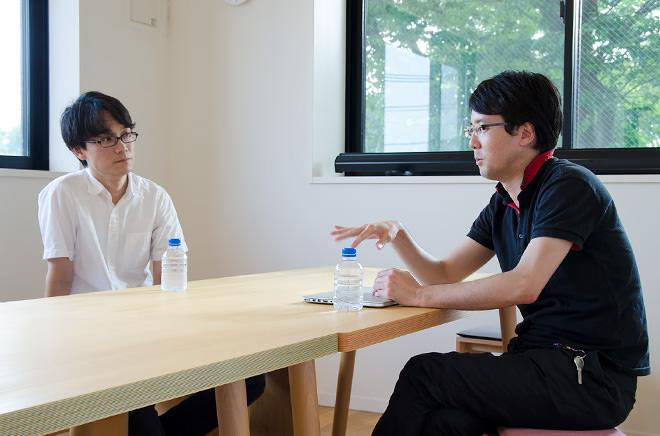
-
 小野木
小野木 -
うんうん。
-
 今村さん
今村さん -
でも、そうなると、デザイナーのクリエイティブはそれほど必要ではなくなってくる。そういう思考になると、自分じゃなくてもできるんじゃないの? という心持ちになりますよね。
-
 小野木
小野木 -
そうなんですよ。ホリエモンが、「物事がデジタルになるということは、基本的に無料化することだ」というようなことを言っているんです。デザインもデジタル化すると価値が薄くなる面はあるので、この言葉には共感できる部分があります。しかも、AI が自分たちの仕事をどんどんできるようになった場合、自分の価値って何だろうと思うんですよね。プロのデザイナーに求められることって何なんでしょう。
-
 今村さん
今村さん -
うん、そうですね……。すごくドライで極端な答え方をすると、自分がやっている活動は、どれだけの経済的価値を生み出せるのかということですよね。自分がデザインしたものが、サービスの売り上げにどれだけ貢献したのかと。そこを突き詰めていく考え方もできると思います。でも、それだけだと、寂しいですよね。
-
 小野木
小野木 -
僕はこの仕事を始めて10年になるんですけど、インプットよりもアウトプットを多めにやってきたんです。でも、これから先、自分がアウトプットするものはどんどん無料化していくのかと思うと……、今後はインプットに力を入れて、人間の観点でディレクションする仕事がいいのかなあと。
たとえば、少し話は飛びますけど、DJ というのは曲をかけ合わせてサンプリングして成り立たせる職業ですよね。そういう風に、これからは、多くの 1 を集めて新しい 1 を作ることに価値が表れる時代なのかなと思ったり。
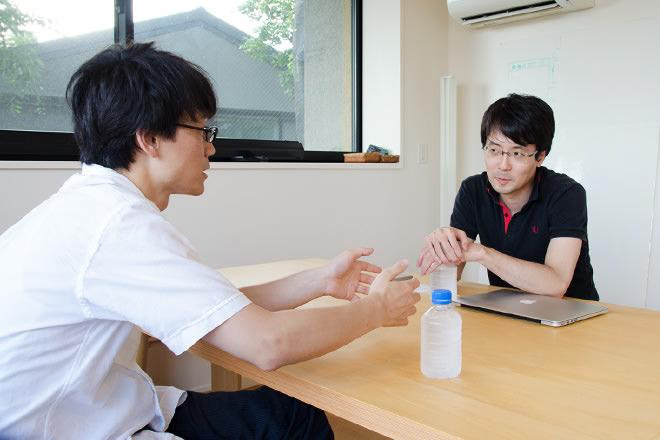
-
 今村さん
今村さん -
なるほどー。
-
 小野木
小野木 -
今村さんにとって、仕事をするうえでコアになっていることは何ですか?
-
 今村さん
今村さん -
やはり、UX ですよね。この領域を核にして、サービスの企画の部分や最終的なグラフィック、アイディアの発想はどうしていくか……。何をどれだけ広げていけるかというのを模索している感じです。UX のディレクターというのは、利用者の体験を作るのが仕事なので。その体験にふさわしいメディアはウェブなのか映像なのか、あるいは紙媒体なのかということも考えられる。
-
 小野木
小野木 -
UXというのは、いろいろなものに展開していけますよね。
-
 今村さん
今村さん -
そう。そのあたりが、対象物がはっきりしているデザイナーとは違います。唐突ですけど、「経験値」という言葉がありますよね。「経験値」とは、体験したことを吸収して、自分のなかで抽象化して肥やしにしたもの。いろんな手段を使ってこの「経験値」を上げる仕組みをつくるのが、UX ディレクターの仕事だと思うんです。
経験そのものは自分自身のなかにあるものなので、それをデザインすることはできない。だから、僕の職業は、UX デザイナーではなく、UX ディレクターという名称なんですね。
何にやり甲斐を感じるかって、「大事にしている人たちとともに、仕事をする時間を楽しめること」なんです
-
 小野木
小野木 -
僕はたまにTVゲームをするんですけど、たとえば、カーソルを合わせるだけで、「自分は今この場所にいる」ということが直感でわかる仕掛けがあるんです。そういうのは、人間が感性で選んでいる感じがあって、いいなあと思う。かといって、自分が Web やアプリでゲームっぽいデザインをしたいのかというと、そうではないですけど。何か、もうちょっとやれることはあるのかもしれないなあと思うんです。
-
 今村さん
今村さん -
そうですね。ゲームは特殊ですよね。ある種没頭できる世界観がベースにあって、そこでどう個性を作っていくかという考え方。そこから、どういう操作体系にするか、デザインのユニーク性を研ぎ澄ませていくかというおもしろさがあると思います。ただ、Web やアプリのサービスでそれを応用してあまりにも個性的にすると、使う側の人はとっつきにくいんですよね。
-
 小野木
小野木 -
そうそう(笑)。
-
 今村さん
今村さん -
ただね、まったく違った、新しいデザインを作り上げていくフェーズがまた来ると思いますよ。そのとき大事になってくるのは、ゲームのような個性をどう作っていくかということ。人間中心設計とは全然違う考え方ですよね。誤解を恐れずに言うと、人間中心設計というのは、利用者をすごく観察して、「この人にとってはこういうものがよさそうかな」と、思考パターンを探ってから動くこと。
例えると、大好きな女性を前にして、「僕は、あなたの好きな男性になります!」という感じですね。でも、それと正反対なのは、「俺はこういう性格で、こんな価値観をもっている人間だ。俺のこと、好きだろ?」というタイプ。ガチッとした個性で作り上げられているゲームは、後者のオラオラ系に属します。しかも、そのうえでユーザーの心をつかんでいるゲームは、圧倒的な個性と魅力の持ち主ですよね。
-
 小野木
小野木 -
そうです、その通りです。
-
 今村さん
今村さん -
それでね、僕の考えとしては、新しいものを生み出していくには、コミュニケーション力しかない、と。今一番大切に考えているのは、そこなんです。
-
 小野木
小野木 -
ほほぉ。
-
 今村さん
今村さん -
AI時代にどう生き残っていくかという、その新たな道は、結局人と人が対話して新しいものを生み出していくしかない。なぜなら、どれぐらいのオラオラ系を発揮するのか、そのことを決めるのも、人と人が議論を重ねて作り上げられるものですから。僕は今後、いろんな専門家の人とちゃんと話ができるようになりたい。
たとえば、AI の専門家や経営層の人、もちろん、デザイナー、クリエイターとも話ができて、ビジネスがわかる人間としてデザインやディレクションをやっていきたいと思っています。いや、もっと言うと、どういうことを成し遂げたいとか、そういうこと以前に、一緒に仕事をする「人」を大事にしたい。何にやり甲斐を感じるかって、仕事をする時間を大事な人たちとともに楽しめること、なんです。
-
 小野木
小野木 -
その考え方、めちゃくちゃいいですね。
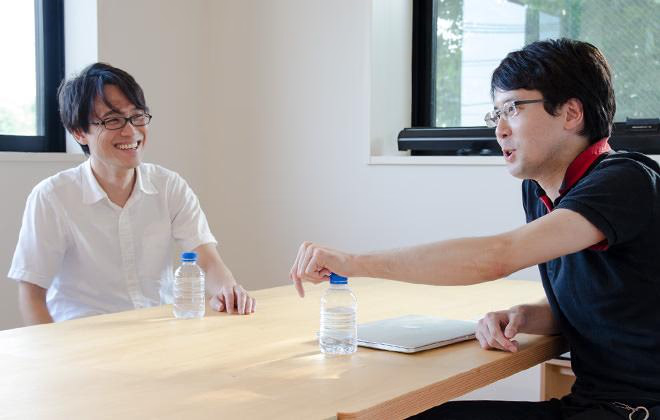
-
 今村さん
今村さん -
だってね、ディレクターの仕事をしていると、ほとんどの時間を打ち合わせで占めますよね。お客さんと、仕事のパートナーと話をする時間は実に長いんです。そこが楽しくないと、もう何か、生きていても楽しくないなあと。そこですごくつらい思いをして成果を出すというのは、今はやりたいことではないですよね。
-
 小野木
小野木 -
おっしゃる通りです。
-
 今村さん
今村さん -
たとえば、発注する側が対価を支払うことを前提に、我々に「こうして下さい」と依頼内容だけを伝えるのは、経済活動のなかでは正しい流れかもしれないけれど、ちょっと切ない。そうじゃなくて、お互いをリスペクトする気持ちが大事ですよ。
-
 小野木
小野木 -
うわぁ、いいですね。僕は、その考えをもつ今村さんをリスペクトします(笑)。
-
 今村さん
今村さん -
あははは。いや、20代の頃はね、苦しくても、アウトプットがよいものであれば、ある種の満足感があったんです。でも、30代半ばになって捉え方が変わってきましたね。仕事そのものを楽しまないと、いいアウトプットはできないんじゃないか? と。
-
 小野木
小野木 -
そうですよね。同世代同士、コミュニケーションを密に、楽しむことを忘れずにいきたいものです。またご一緒しましょう!
インタビューを終えて 〜今村さんへの手紙〜
インタビューした小野木にとって、同世代で、同じクリエイティブの分野で活躍されている今村さんとの出会いは大きいとのこと。現在も学びや刺激を多くもらっていると言います。共通項も多いふたりは、デザインのことはもちろん、仕事のこと、プライベートのことなど話は尽きず、インタビュー中も何度も場が沸いたのが印象的でした。
そんなインタビューを終えたあと、あらためて小野木から今村さんへ手紙を書きました。
今現在も新しいプロジェクトでご一緒させていただいて、改めて出会えたことを嬉しく思っています。
モノサスの場合、直クライアントの案件が多いため、クリエイティブ面で他者と協業することって、あまり多くありません。そんな中、お互い違った仕事のレイヤーで、ひとつの目的に向かって、デザインを完成させていくという過程が、とても大きな学びになっています。
特に打ち合わせ時の言動の要所要所に、デザインとUIとUXをとても大きい視野で見てらっしゃるなと感じていて、普段私が従事している案件ではなかなか得られない考え方に、はっと気づかされることが多々あります。
社会人になり約12年、たくさん勉強してきましたが、私のこの先10年に間違いなく影響する出会いだったと感じております。
今後もたくさん学ばせていただき、一緒に楽しく仕事ができたらと願うばかりです。
ありがとうございました!小野木 雄
